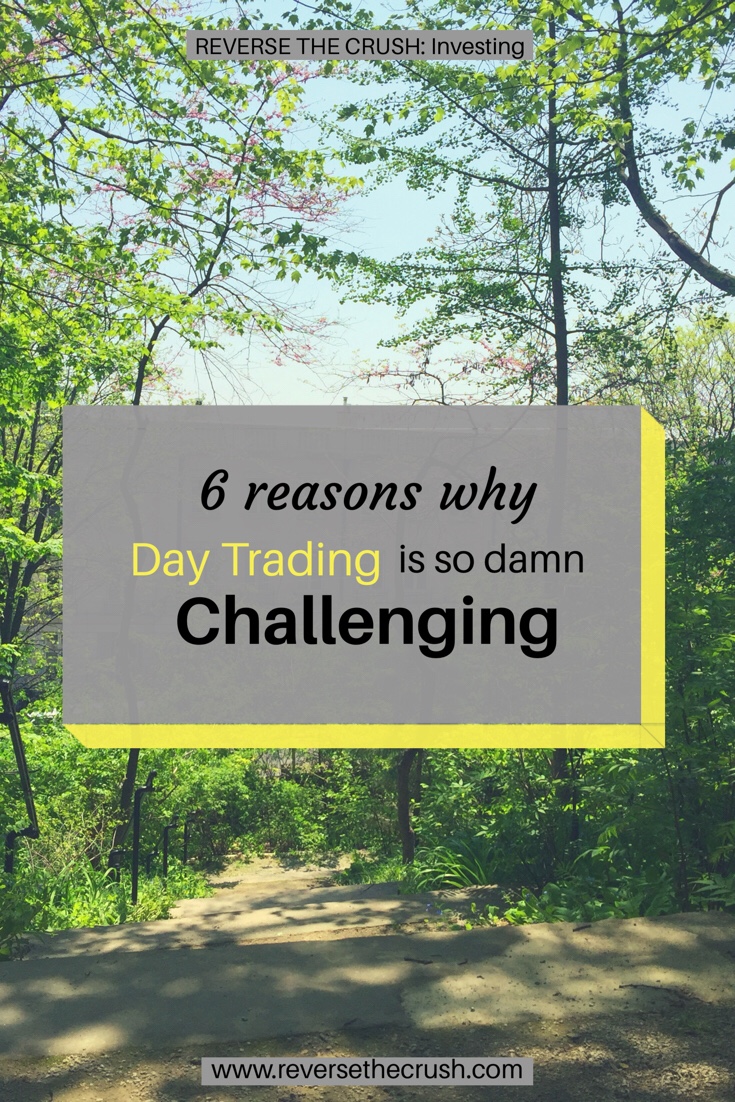Day trading has to be one of the most difficult jobs on the planet. Anyone with experience knows I’m not kidding. There’s a reason that so many costly courses are out there claiming to show you the way.
But in my opinion, there’s only one way to really learn. It’s called TRADING!
You really just have to do it. After 4 months of actually placing real trades with my own money on the line, this is the conclusion I’ve come to realize. Sure, the courses are great and can be an excellent addition after you’ve built up a foundation. But I still see major issues for all those that are intrigued by the idea of trading.
Most are looking for easy money and don’t want to put in the work. And if you only learn by paying for a course, to me, it’s a reflection of a few other predicaments.
One, you don’t believe in yourself. Two, you don’t have the guts. And three, when attempting to trade, you will be referring back to someone else’s methods instead of your own.
You never really develop your own style, which is rather limiting. Imagine you’re in a trade and it doesn’t go as planned. If you have your own plan created, you can act accordingly. If you are referring to someone else’s method, you’ll be sitting there wondering how they would handle it. You can’t be pondering such questions when seconds are crucial. The quicker you act the better.
But there’s a different question I’ve been wondering lately. I’ve come across others that are intrigued by trading. They all claim that it’s an interest and that they plan on starting.
Instead, I think they would rather just live vicariously through me. Rejoicing when I have a winning streak and allowing it to deplete their interest when I have a bad set of trades.
So I started wondering why trading is so incredibly challenging?….
6 Reasons Why Trading Is So Challenging
1. Most Don’t Know Where To Start
It’s like I said earlier, the best way to learn is actually start trading. However, before you do that, you should try paper trading to begin developing a style and comfortability with a platform. At first you might be placing trades based on nothing but in doing so, you will begin to see a pattern. Before you know it, a style has developed and you’ve actually built up a criteria for entry points. If you say you want to trade, but aren’t willing to do this, don’t bother starting. You’re not committed enough and will more than likely fail.
2. The Extra Work Behind The Scenes
A lot of people seem to have this glamorous vision of what day trading is actually like. Maybe it’s due to the way hollywood idolizes the Wall Street culture. I’m not totally sure on what the reason is. Because once you get to a certain place in life, most people realize that nothing good comes without putting the work in. And trading is no exception. I get this idea that people think they’re going to squeeze in a trade on breaks and consistently pull in a profit. Well, let me tell you, it won’t happen. The timing will probably be off and you can’t honestly expect to be successful by skipping out on the leg work.
What extra work am I referring to? Well I can only speak for myself here, but there are records to track in spreadsheets. Otherwise, you’ll have a nightmare on your hands come tax time. There are so many traders that are too lazy to do this. They angrily call into their brokerage demanding records of all trades just weeks before the tax deadline. Have some accountability for frig sakes!
Another behind the scenes function that is required routinely is preparation. You need to have at least an idea of an entry, exit point, and risk management strategy before every trade. I do this prior to every single trade by writing it down in a notebook.
3. The Only Job That Can Take Money From You
Most people are salaried or work for an hourly wage right? Well, become a trader and you’re neither. You’re actually closer to that of a poker player relying on probability. Trading is all about probability!
But consider this. It’s really the only job that can leave you finishing work with less money than you started the day off with. How intimidating is that? It’s essential to develop some pretty thick skin to cope with this concept. The main way to overcome this is to accept losses and focus on risk management thereby limiting dollars lost.
4. Mentally Challenging
I’m not sure anything is as mentally taxing as trading is. There’s a reason most won’t even try it. Maybe they already know they aren’t mentally tough enough. Just kidding, most people just hear the general consensus about it and are overcome with fear.
I’m sure we’ve all heard a story of someone who lost money in the market. But do we ever consider that persons credibility before we write it off? Do we consider the fact that most people aren’t thorough enough? Or how most would rather make statements based off no actual experience whatsoever then to actually go out and try something for themselves? Most people just like to blow smoke.
The point I’m trying to make is trading is extremely tough, but not impossible. You just need to be a special kind of person. A come back the next day type of person. A person with the ability to overlook one trade and pay attention to an overall series of trades. You need a Kobe Bryant level of toughness.
From my own experience, I know for a fact that a bad trade can cause you to make stupid decisions. It can break you down mentally so that you overreact to the money you just loss. It can cause you to make the same trade twice. That’s called letting emotion get the best of you. Day trading can ruin the rest of your day if you allow it. Remember, it’s about probability.
5. Globally Competitive
Every day you wake up and trade, you’re going to war. There are tons of great minds all around the world attempting to do the same thing as you. Everyone wants to buy low and sell high. You’re competing with Wall Street, robo-traders, and intelligent people around the globe. You have to compete by sticking to your strategy without interference of emotion.
6. The Realization That Less Is More
This might be the toughest concept to grasp. But to be successful, sometimes, you have to not make money.
Allow me to give you an example. Let’s say on Monday morning the market opens up and you get ready to trade. The only problem is that there’s no visible entry point to be seen. If you succumb to the pressure of thinking you need to make money, you might be tempted to force a trade. Once that happens, you lose $100. Now for Tuesday, you not only need to make money for that day, but you need to make the money back you the lost the day before.
On the contrary, let’s say you opt not trade on Monday. The bad news is that you didn’t make any money for the entire day. The good news is that you didn’t lose any and you might be free to focus on other projects.
The next day, you wake up and fire up your laptop and get prepared to trade. And on this day, there’s more volume and a more obvious entry point. So you put on the trade and it ends up making you $200. Based on that scenario, you are up $200 instead of only being up $100 because you lost on Monday.
I’ve definitely been noticing in my own trading that less is more.

Final Thoughts
So there you have it. After 4 months of trading, those are some of the reasons I believe trading to be so challenging. It’s also why most people are so fearful of it.
It’s the combination of mental toughness, patience, and controlling emotions that are the most difficult obstacles to overcome.
But really, there’s only one way to know. Try it! See if you enjoy it. Just understand that it takes a lot of time and commitment. Also be prepared to accept losses. In the end, if you hit on 6 out of 10 trades and know how to manage risk, you can make a profit. However, there are other styles out there that might even require a lower percentage of winners.
Question: Are there any other reasons why trading is so difficult?
I am not a licensed investment or tax adviser. All opinions are my own. This post contains advertisements by Google Adsense. This post also contains internal links, affiliate links, links to external sites, and links to RTC social media accounts.
Earn passive income through dividend investing with RTC’s link below ($50 in free trades):

Connect with RTC
Twitter: @Reversethecrush
Pinterest: @reversethecrushblog
Instagram: @reversethecrush_
Facebook: @reversethecrushblog
Email: graham@reversethecrush.com


 Monthly Costs to Work From Home
Monthly Costs to Work From Home
